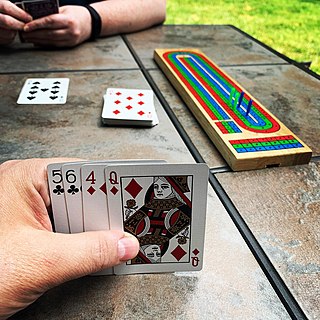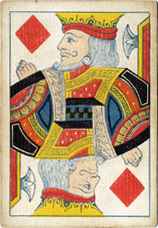
Poker is a family of comparing card games in which players wager over which hand is best according to that specific game's rules in ways similar to these rankings. While the earliest known form of the game was played with just 20 cards, today it is usually played with a standard deck, although in countries where short packs are common, it may be played with 32, 40 or 48 cards. Thus poker games vary in deck configuration, the number of cards in play, the number dealt face up or face down, and the number shared by all players, but all have rules that involve one or more rounds of betting.
Five-card stud is the earliest form of the card game stud poker, originating during the American Civil War, but is less commonly played today than many other more popular poker games. It is still a popular game in parts of the world, especially in Finland where a specific variant of five-card stud called Sökö is played. The word sökö is also used for checking in Finland.
Seven-card stud, also known as Seven-Toed Pete or Down-The-River is a variant of stud poker. Until the recent increase in popularity of Texas hold 'em, seven-card stud was the most widely played poker variant in home games across the United States, and in casinos in the eastern part of the country. The game is commonly played with two to eight players, though eight may require special rules for the last cards dealt if no players fold. With experienced players who fold often, even playing with nine players is possible.

President is a shedding card game for three or more, in which the players race to get rid of all of the cards in their hands in order to become "president" in the following round. It is a Westernized version of Chinese climbing card games such as Zheng Shangyou, and the Japanese Daifugō.

Cribbage, or crib, is a card game, traditionally for two players, that involves playing and grouping cards in combinations which gain points. It can be adapted for three or four players.

Brag is an 18th century British card game, and the British national representative of the vying or "bluffing" family of gambling games. It is a descendant of the Elizabethan game of Primero and one of the several ancestors to poker, the modern version just varying in betting style and hand rankings. It has been described as the "longest-standing British representative of the Poker family."

Thirty-one or Trente et un is a gambling card game played by two to seven people, where players attempt to assemble a hand which totals 31. Such a goal has formed the whole or part of various games like Commerce, Cribbage, Trentuno, and Wit and Reason since the 15th century. 31 is popular in America and Britain. Although the game is also known as Scat it has no connexion whatsoever with Germany's national card game of Skat. It should also not be confused with other games called 31 including Schwimmen and the Greek banking game of 31.
Razz is a form of stud poker that is normally played for ace-to-five low. It is one of the oldest forms of poker, and has been played since the start of the 20th century. It emerged around the time people started using the 52-card deck instead of 20 for poker.

Rummy is a group of matching-card games notable for similar gameplay based on matching cards of the same rank or sequence and same suit. The basic goal in any form of rummy is to build melds which can be either sets or runs. If a player discards a card, making a run in the discard pile, it may not be taken up without taking all cards below the top one.
Pusoy dos, a variation of big two, is a popular type of "shedding" card game that originates on the islands of the Philippines in Calauag, Quezon Province. The object of the game is to be the first to discard one's hand by playing them to the table. If one cannot be first to play all cards, then the aim is to have as few cards as possible. Cards can be played separately or in certain combinations using poker hand rankings. Games of Pusoy Dos can be played by three or four people.
Chinese poker is a card game based on poker hand rankings. It is intended as a beginner-friendly game, with only a basic knowledge of poker hand rankings needed to get started. The format allows for frequent unexpected outcomes due to the large element of luck involved, meaning a beginner has a good chance of winning in the short term against even experienced opponents.

Monopoly: The Card Game is loosely based on the board game Monopoly. The idea is to draw, trade and organize cards into "color-groups" along with bonus cards. Players take turns drawing and discarding cards until one completes a hand. The value of each player's hand is then counted and they receive the amount of Monopoly money they have earned. The first person to collect $10,000 wins.

Daifugō or Daihinmin, also known as Tycoon, is a Japanese shedding-type card game for three or more players played with a standard 52-card pack. The objective of the game is to get rid of all the cards one has as fast as possible by playing progressively stronger cards than those of the previous player. The winner is called the daifugō earning various advantages in the next round, and the last person is called the daihinmin. In that following round, winners can exchange their one or more unnecessary cards for advantageous ones that losers have.

Ranter-Go-Round is a primitive gambling game and children's game using playing cards. It is known in most European countries as Cuckoo; the French variant being called Coucou. Other English-language names include Chase the Ace and, in America, Screw Your Neighbor which, however, is a name also used for other games.
Teen patti is a gambling card game that originated in the Indian subcontinent and is popular throughout South Asia. It originated in the English game of three-card brag, with influences from poker. It is also called flush or flash in some areas.
The rules here are based on those of the American Cribbage Congress and apply to two-, three- or four-player games, with details of variations being listed below.
The following is a glossary of poker terms used in the card game of poker. It supplements the glossary of card game terms. Besides the terms listed here, there are thousands of common and uncommon poker slang terms. This is not intended to be a formal dictionary; precise usage details and multiple closely related senses are omitted here in favor of concise treatment of the basics.
Court Piece is a trick-taking card game similar to the card game whist in which eldest hand makes trumps after the first five cards have been dealt, and trick-play is typically stopped after one party has won seven tricks. A bonus is awarded if one party wins the first seven tricks, or even all tricks. The game is played by four players in two teams, but there are also adaptations for two or three players.

Tippen, also known as Dreiblatt, Dreikart, Drei Karten, Dreekort, Kleinpréférence or Labet, is an historical German 3-card, plain-trick game which was popular as a gambling game for three or more players. The Danish version of the game was known as Trekort and more elaborate Swedish variants include Knack and Köpknack. It appears to be related to the English game of 3-Card Loo. It was banned as a gambling game in some places.

Open-face Chinese poker, OFCP, commonly known as Open Face Chinese or OFC, is a variant of Chinese poker where players receive five cards to start and then one card at a time until each player has a 13 card hand legal or not. The game originated in Finland during the mid-2000s and spread to Russia a few years later. Professional poker player Alex Kravchenko, who is credited with introducing the game to the Russian high-stakes community, describes the game as "spreading like a virus". The game was introduced to the United States in 2012.











